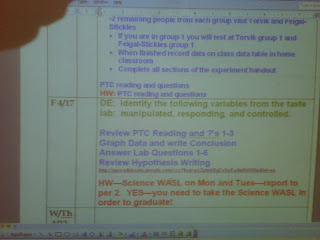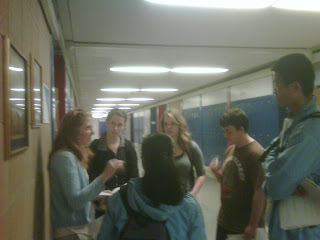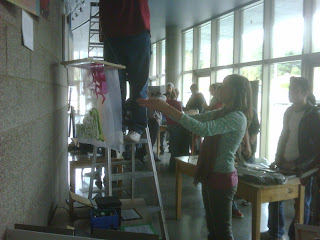Monday, April 27, 2009
Our Resources Are Committed to the Classroom!
The School’s resources should be dedicated to teaching and learning.
Ultimate administrative and budget targets should include student loads that promote personalization and substantial time for collective planning by teachers.
We are all feeling the effects of challenging financial times. In the State of Washington, our schools are particularly vulnerable since our revenue fluctuates directly with the volatile and changing economy. During this last budget cycle we had some difficult conversations as a staff, but as hard as our decisions were, I was inspired by the fact that as a community we knew our priorities. We work to keep resources in powerful classroom teaching and in necessary social/emotional support for students . Our budget process helped us to reflect and refocus on our essential work.
Thanks in large part to your support and contributions to our Annual Campaign, we have been able to maintain school staffing that will continue to provide small class sizes for ninth grade academies and math classes. As this month’s principle states, we strive to maintain small class loads that promote personalization and hence greater success. Although we cannot do this in all classes, we have identified key junctures--the ninth grade--and content areas—mathematics--where we often leave students behind. Our data continues to indicate that the added resources in these areas are creating remarkable success for all students.
Our Tuesday late start days give our teams and departments absolutely priceless time to plan collaboratively, to refine curriculum, and to analyze student work so that we can better teach your students. We are so grateful for your support of our staff on Tuesdays! Research shows again and again that teacher practice, and hence student success, improve dramatically when teachers have the chance to leave their individual classrooms and learn from one another.
If you stop by my office, you will see a bookcase just outside my door, where I keep an ever-evolving collection of fresh and exciting titles. Students and staff are welcome to borrow a book and keep it if they wish. Maintaining this little main office library is my way of focusing each day on our essential function as a school community; whatever work we do administratively, our first job is to model and practice critical thinking, literacy, problem-solving, and the joy of lifelong learning.
This library is also a tangible manifestation of the “stone soup” principle. What began as a small collection of books culled from my home and second hand bookstores has grown to abundance as anonymous givers regularly contribute to the collection. Regardless of the difficult financial times, when we are committed to core principles, to keeping our classrooms vibrant and rigorous, to keeping students at the heart of all we do, we will continue to thrive. Thank you for your generosity, and for sharing your remarkable students with us.
Best wishes for a happy spring!
Marni Campbell
Tuesday, April 21, 2009
Sun, Science, and Scholars
PE teacher Hoover Hopkins takes advantage of the sunshine to teach his students on Raider Field:

 Physics students have created white boards to show their understanding of complex ideas:
Physics students have created white boards to show their understanding of complex ideas:

Daily assignment log projected in a 10th grade Biology class showing their work on a genetics lab. Note the Daily Engage question: Identify the following variables from the taste lab: manipulated, responding and controlled.

US History scholars get some quality coaching on historical analysis from teacher Erin Lynch as they prepare to write an essay:

Friday, April 17, 2009
Nathan Hale Artists



Members of Nathan Hale's Concert Choir, accompanied by the talented Yuki N. and directed by Mr. Nolet, practice "Dona Nobis Pacem" in our Performing Arts Center gallery:

May Coalition Principle
The School’s resources should be dedicated to teaching and learning.
Ultimate administrative and budget targets should include student loads that promote personalization, substantial time for collective planning by teachers.
We are all feeling the effects of challenging financial times. In the State of Washington, our schools are particularly vulnerable since our revenue fluctuates directly with the volatile and changing economy. During this last budget cycle we had some difficult conversations as a staff, but as hard as our decisions were, I was inspired by the fact that as a community we knew our priorities. We work to keep resources in powerful classroom teaching and in necessary social/emotional support for students . Our budget process helped us to reflect and refocus on our essential work.
Thanks in large part to your support and contributions to our Annual Campaign, we have been able to maintain school staffing that will continue to provide small class sizes for ninth grade academies and math classes. As this month’s principle states, we strive to maintain small class loads that promote personalization and hence greater success. Although we cannot do this in all classes, we have identified key junctures--the ninth grade--and content areas—mathematics--where we often leave students behind. Our data continues to indicate that the added resources in these areas are creating remarkable success for all students.
Our Tuesday late start days give our teams and departments absolutely priceless time to plan collaboratively, to refine curriculum, and to analyze student work so that we can better teach your students. We are so grateful for your support of our staff on Tuesdays! Research shows again and again that teacher practice, and hence student success, improve dramatically when teachers have the chance to leave their individual classrooms and learn from one another.
If you stop by my office, you will see a bookcase just outside my door, where I keep an ever-evolving collection of fresh and exciting titles. Students and staff are welcome to borrow a book and keep it if they wish. Maintaining this little main office library is my way of focusing each day on our essential function as a school community; whatever work we do administratively, our first job is to model and practice critical thinking, literacy, problem-solving, and the joy of lifelong learning.
This library is also a tangible manifestation of the “stone soup” principle (see http://en.wikipedia.org/wiki/Stone_soup for a retelling of this folk tale). What began as a small collection of books culled from my home and second hand bookstores has grown to abundance as anonymous givers regularly contribute to the collection. Regardless of the difficult financial times, when we are committed to core principles, to keeping our classrooms vibrant and rigorous, to keeping students at the heart of all we do, we will continue to thrive. Thank you for your generosity, and for sharing your remarkable students with us.
Best wishes for a happy spring!
Marni Campbell
Monday, March 30, 2009
The Heart of Teaching
 Dr. Suzuki
Dr. SuzukiThe principal and teachers should perceive themselves as generalists first (scholars in the art of teaching) and specialists second (experts in one particular discipline). Each staff member should have a sense of commitment to the entire school. April’s CES Principle
One late afternoon I sat at watching my five year old’s piano lesson. Her teacher was trained in the method of Dr. Suzuki, a musician and master teacher who wrote: "Teaching music is not my main purpose. I want to make good citizens. If children hear fine music from the day of their birth and learn to play it, they develop sensitivity, discipline and endurance. They get a beautiful heart. "
My daughter was having a hard time with a particular passage in the piece she was learning. No matter how hard she tried, she couldn’t get her hand to play the notes smoothly with the right fingering. The more frustrated she became, the harder it was for her to play. “Here,” said her wise teacher. “Put your hand on top of mine while I play it.” I vividly remember the sight of my young daughter’s small hand on top of her teacher’s older one, feeling the correct rhythm and notes. She immediately was able to play the passage on her own.
At the time I was a High School English teacher, struggling to help my 11th graders combine logic, language, and personal voice in their persuasive and analytical essays. In a flash, I realized that I could guide my students intellectually as writers just as Mrs. Schweiger had guided my daughter. The next day in English class with a laptop and a projector I modeled the writing process word-by-word, sentence-by-sentence, for my students. They watched and listened as I wrote, and they developed a stronger feel for the steps they needed to take themselves as writers.
This month’s common principle speaks to the importance of teachers being “generalists” first and foremost, practitioners in the art of teaching. This does not mean that teachers shouldn’t be skilled and knowledgeable in their particular disciplines, but it does mean that the best educators prize the craft of teaching. They seek out new ways to teach and coach students, and find inspiration all around them. My daughter’s piano teacher was and continues to be a model to me of excellent teacher craft. She is patient, exacting, and intuitive. She has a passion for the music that inspires her students. I still sit each week and watch her teach my children, and I continue to learn from her.
Great teaching is all around us at Nathan Hale. In the Ceramics classroom, a patient teacher models the techniques of slipping and scoring. In the Math classroom, a skilled teacher gives just the right amount of wait time so that her students have time to reason through a problem. In a Science classroom, a creative teacher creates a model to show the results of a meteor impact with flour, cocoa, and different shapes, weights, and sizes of “meteors.” In a Social Studies classroom, students engage in a Socratic Seminar focused on an article they’ve read about appreciation vs. appropriation in preparation for their Harlem Renaissance projects. In each case, students are developing “sensitivity, discipline, and endurance.”
Marni Campbell, Principal
Thursday, March 26, 2009
Raiders Connect With the Wide World!
.jpg)
.jpg)
.jpg)
Nathan Hale AP Environmental Science students take time out of their mid-winter breaks to lobby in Olympia on Environmental Lobby Day:









